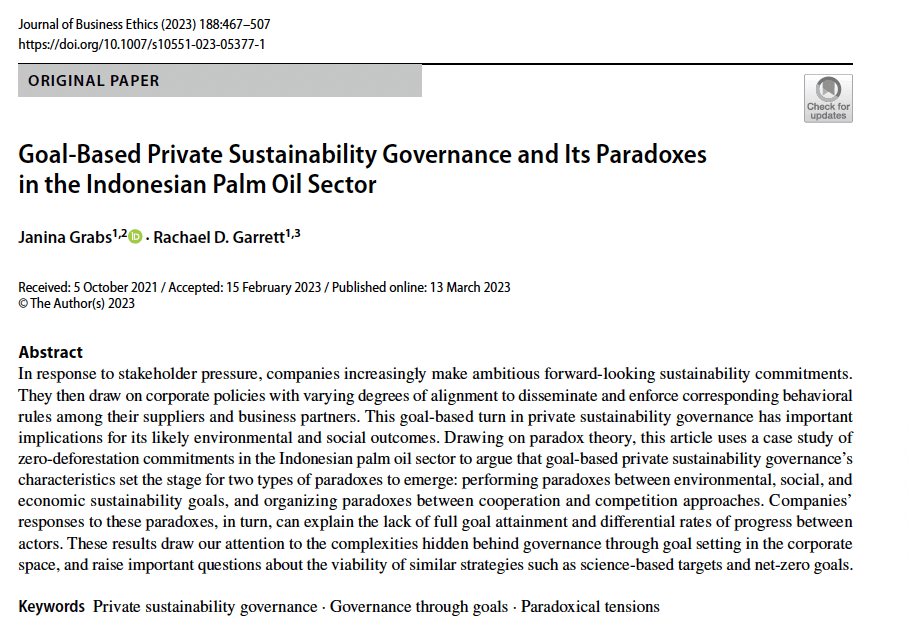︎

Janina Grabs
ESADE Business School and Environmental Policy Lab, Department of Humanities, Social and Political Sciences, ETH Zürich
Janina Grabs is an Assistant Professor of Business and Society at the Department of Society, Politics and Sustainability at ESADE Business School, Barcelona. She received her PhD in Political Science from the University of Münster, Germany, and previously was a post-doctoral researcher at ETH Zurich and visiting researcher at Yale University. Her work focuses on the private governance of sustainability in global value chains, with a special focus on tropical agricultural commodities such as coffee and palm oil. Her work on the effectiveness of private sustainability governance in the coffee sector has been widely recognized, inter alia with ESG’s Oran R. Young Prize, APSA’s Virginia M. Walsh Dissertation Award, and ECPR’s Giandomenico Majone Prize, and is published in the book “Selling Sustainability Short? The Private Governance of Labor and the Environment in the Coffee Sector” (2020, Cambridge University Press), which received the AoM 2021 ONE Book Award. She has further published in leading peer-reviewed journals including Regulation & Governance, Business Strategy and the Environment, New Political Economy, the Journal of Economic Geography, Ecological Economics, and the Journal of Environmental Management. Janina is also a research fellow of the Earth System Governance project, is the Earth System Governance Journal’s Book Review Editor, serves on the Outreach Committee of the International Studies Association’s Environmental Studies Section, is a founding member of the ECPR Standing Group on Regulatory Governance’s Early Career Network, and sits on the Standing Group on Regulatory Governance’s Steering Committee.
MORE ABOUT JANINA GRABS >2023
Janina Grabs and Rachael D. Garrett
Goal‑Based Private Sustainability Governance and Its Paradoxes in the Indonesian Palm Oil Sector
In response to stakeholder pressure, companies increasingly make ambitious forward-looking sustainability commitments. They then draw on corporate policies with varying degrees of alignment to disseminate and enforce corresponding behavioral rules among their suppliers and business partners. This go...

2022
Rachael D. Garrett, Janina Grabs, Federico Cammelli, Florian Gollnow, and Samuel A. Levy
Should payments for environmental services be used to implement zero-deforestation supply chain policies? The case of soy in the Brazilian Cerrado
Over the past decade public and private actors have been developing a variety of new policy approaches for addressing agriculturally-driven deforestation linked to international supply chains. While payments for environmental services (PES) have been advocated in many contexts as an efficient and pr...

Janina Grabs, Federico Cammelli, Sam Levy, and Rachael Garrett
How to find synergies between effectiveness and equity when designing supply chain sustainability policies

2022
Federico Cammelli, Samuel A. Levy, Janina Grabs, Judson Ferreira Valentim, Rachael D. Garrett
Effectiveness-equity tradeoffs in enforcing exclusionary supply chain policies: Lessons from the Amazonian cattle sector
To address ongoing deforestation for global food commodities production, companies and governments have adopted a range of forest-focused supply chain policies. In the Brazilian Amazon, these policies take the form of market exclusion mechanisms, i.e., immediately dropping suppliers who have cleared...

2021
Janina Grabs, Federico Cammelli, Samuel A. Levy, Rachael D. Garrett
Designing effective and equitable zero-deforestation supply chain policies
In response to the clearing of tropical forests for agricultural expansion, agri-food companies have adopted promises to eliminate deforestation from their supply chains in the form of ‘zero-deforestation commitments’ (ZDCs). While there is growing evidence about the environmental effectiveness ...

